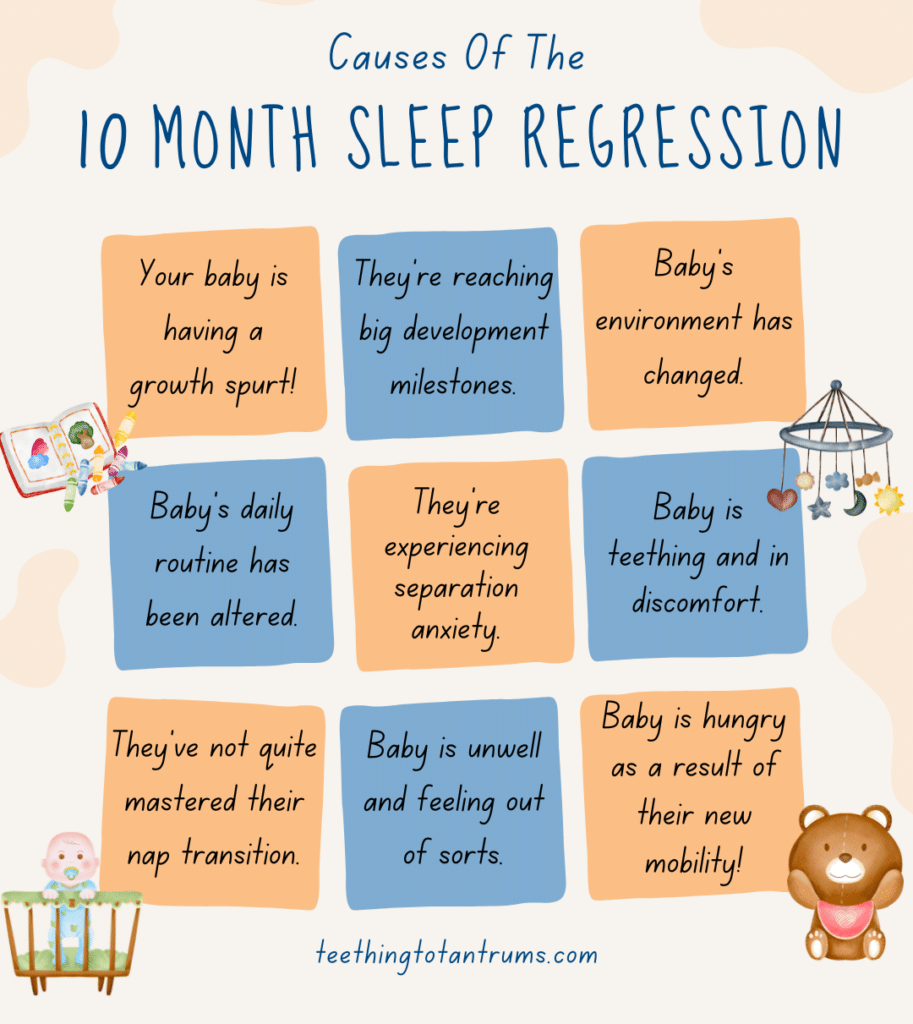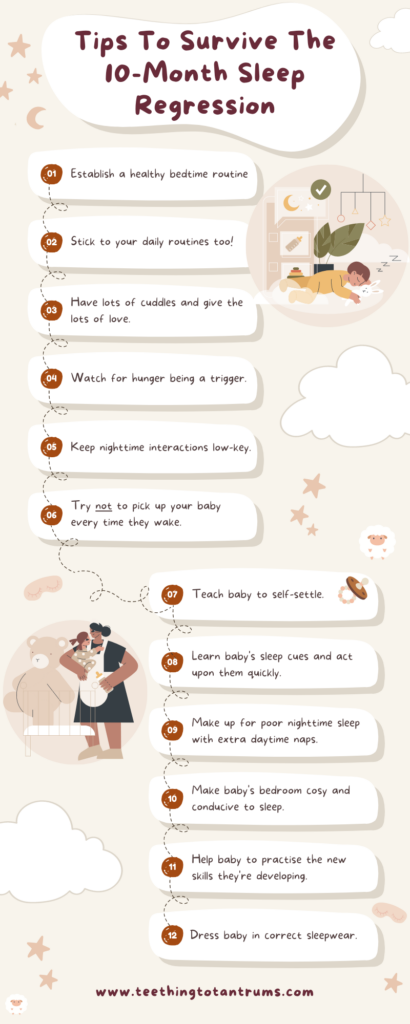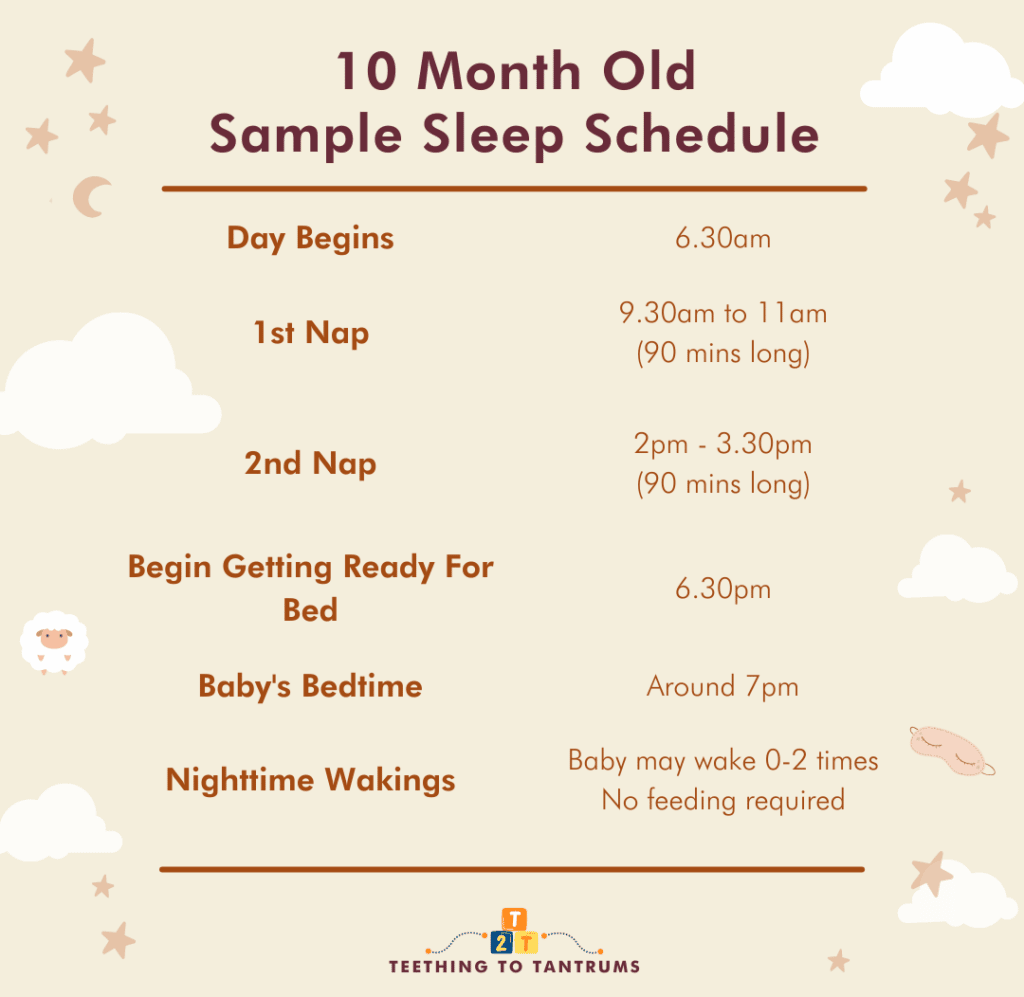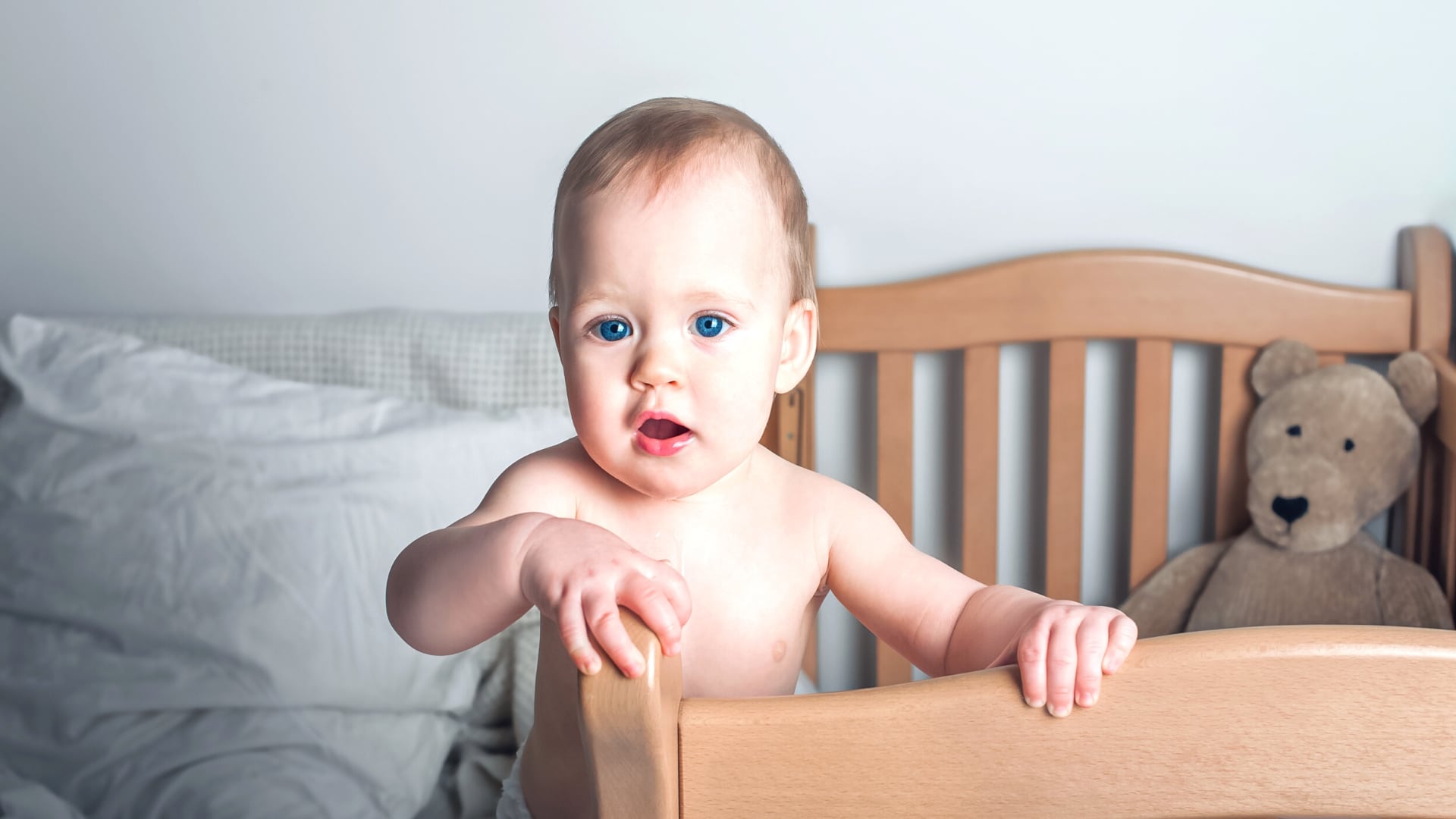Baby suddenly fighting sleep? Being fussy? Struggling to settle? The 10 month sleep regression has arrived. Here’s what that means, and what exhausted parents need to know to get through it.
What Is The 10 Month Sleep Regression?
The 10 month sleep regression is a short time in which your baby’s sleep cycles become disrupted by them fighting sleep, waking more often and struggling to fall back asleep usually as a result of developmental leaps or inconsistent sleep routines.
How Long Does The 10 Month Sleep Regression Last?
The 10 month sleep regression, like all sleep regressions, commonly lasts between 2 and 6 weeks depending on the trigger.
Causes Of The 10 Month Sleep Regression
There is not always one clear reason why your baby may be experiencing a sleep regression but at 10 months old there is a lot going on in your baby’s world that can cause sleep disruption.
Check out these causes of the 10 month sleep regression and see if you can identify any that may have occurred in your baby’s life recently:

- Your baby is having a growth spurt! All that extra energy needed to grow can easily disrupt a well-established sleep pattern and trigger a 10 month sleep regression.
- They are reaching big physical milestones, mental and emotional developmental milestones. A lot is going on developmentally at this age with your little one perfecting the art of crawling, pulling to stand and cruising around furniture. There is a lot going on cognitively as well as they become increasingly aware of the world around them and their place in it. They are also starting to use words to communicate. All that extra brain development and body activity can easily disrupt their sleep!
- You have changed baby’s environment. Moving house, going on holiday or visiting family overnight can all trigger night wakings and a sleep regression.
- Baby’s daily routine has changed. Any major changes in routine could also upset an established sleep schedule such as starting daycare, parents returning to work or the primary caregiver changing.
- Your baby is experiencing separation anxiety. Separation anxiety is also very common at this age and it will make it difficult for your baby to fall asleep and can cause them to become distressed when they wake up in the night and discover you’re not with them.
- They’re teething. If your baby is experiencing pain due to teething their sleep is very likely to be disrupted for a short while and although this is not a true sleep regression in itself, it may trigger one. Investing in a natural teething toy can help soothe your baby resulting in helping them sleep better!
- Baby has not quite mastered their nap transition. Around 9 months of age, babies will go from 3 naps a day down to 2. If baby’s sleep schedule has not been adjusted, their sleep schedule may be off-balance resulting in a cycle of overtiredness and hyperactivity and ultimately ending in a regression.
- Your baby is unwell. Like teething, illness may cause a sleep disruption for a short period of time and although this is not a true sleep regression, sickness can trigger a brief one.
- Your baby is hungry. With all the increased physical activity that your 10 month old is now capable of they may need more calories to keep them going. This can result in them waking more often due to hunger so you need to keep an eye on their calorie intake during the day and especially in the evenings.
Is My Baby Really Going Through A 10 Month Sleep Regression?
If your little one has been sleeping well and now their sleep habits and awake time have suddenly changed and they struggle to settle or fight sleep… especially if it coincides with them hitting a developmental milestone, then you can safely assume that your baby has hit a sleep regression.
10 Month Sleep Regression Signs
The signs to identify whether your baby is going through a 10 month sleep regression or not are:
- Baby has difficulty falling asleep. If your baby has been falling asleep nicely and then starts to regress to resisting sleep and struggling to settle then it is very likely they have hit a sleep regression.
- Your baby is crying more and becoming agitated when they wake. This is because a 10 month regression results in less deep refreshing sleep your little one may wake in a grumpy mood and be rather fussy and unsettled.
- They wake more often at night and struggle to get back to sleep. As with finding it more difficult to fall asleep, it is typical during a sleep regression due to the change in their sleep pattern for your baby to wake more often at night. This may also affect how long they stay asleep during the day.
- Your baby is learning new skills. If your baby is starting to crawl or pulling to stand and cruising around furniture, they will be stimulating their brain and body to the point that they find it difficult to unwind at naptime and bedtime.
- Your baby is more alert and interested in their surroundings. As with learning a new skill, developing an interest in their surroundings means your little one’s brain is being very stimulated and may struggle to wind down for sleep
- Your baby fights sleep despite being tired. During a sleep regression, it is easy for your little one to become overtired and this can result in them fighting sleep. In addition, when learning new skills the extra stimulation can make it difficult for them to turn off and wind down in order to sleep.
- They are more clingy. By 10 months of age, your baby will definitely be more aware of their surroundings and more attached to those that care for them. This can result in them being more clingy and not liking being left alone (especially when it is time to sleep).
NOTE: Babies that have just learnt to pull to stand will often do so once you have put them down to sleep which can be very frustrating. But you must begin to teach baby to move to a sitting position from standing if you find this happening.
Tips To Get Through The 10 Month Sleep Regression
As someone who has worked with numerous families over the years, I have developed and tested various techniques to help parents and babies navigate through sleep regressions as smoothly and efficiently as possible.
However, I must be honest with you – the 10 month sleep regression can be a real challenge.
I understand that you’re likely feeling incredibly exhausted and overwhelmed, and the thought of losing even more sleep is probably unbearable.
Nonetheless, it’s important to remain committed to your established routines and strategies.
By persevering through this difficult period, your baby will return to their previous sleep patterns much faster, and you’ll avoid having to undo any negative sleep habits in the future.
Remember, short-term discomfort can lead to long-term benefits.
So, without further ado, let’s explore my top tips for surviving the 10 month sleep regression:

1. Establish A Healthy Bedtime And Nap Routine
If you have not established a consistent bedtime routine now is 100% the time to do so.
The benefits of a bedtime routine and having healthy sleep habits will make it easier for you to cope when your baby decides to fight sleep.
And by making it clear to your little one that the end of the day is marked by lowering the energy levels, getting into a cosy bedroom and following the same routine will give them all the right signals that bedtime is on the way.
2. Stick To Your Daily Routines
I cannot stress how much maintaining baby’s healthy daily and bedtime routines will help to keep you sane and keep their healthy development on track.
I know life gets in the way sometimes, but being super vigilant about nap times, meal times and bedtimes during a 10 month sleep regression will make your life so much easier during this time.
So, if you have to cancel a few plans over the coming weeks to ensure you’re at home for naps and bedtime, it will be worth it in the long run.
3. Have Lots Of Cuddles
At the 10-month mark, sleep regressions can sometimes make your little one feel insecure and offering extra cuddles and snuggle time will help comfort them as they navigate this tricky phase.
4. Watch For Hunger Being Nighttime Waking Trigger
It is very tempting to feed your baby in order to get them back to sleep… however, this is not a habit you want to continue.
Therefore, if your baby is experiencing a growth spurt, ensure they are getting enough solid food during the day to support any growth spurt. Offering mid-morning and mid-afternoon snacks can help as well as a milky drink before bed will help.
5. Keep Nighttime Interactions Low-Key
If your little one wakes at night then it’s super important to keep your interactions low-key. Have the lights down low and do not chat to them.
A night light is a great investment for these nighttime interactions as it stops you from having to turn on a light when visiting them at night.
Finding the right night light for your child can be quite a task. You want something safe, comforting, and practical. The Cozy Starry Night Light ticks these boxes, with eye-friendly warm lighting and an easy-to-use dimmer.
Its gentle glow makes it the best night light for feeding baby, diaper changes, or comforting your little one back to sleep.
As your baby grows the Cozy Starry Night Light's starry sky projection can provide comfort and gentle quiet time stimulation. Its soft lighting ensures a dreamy, peaceful environment, supporting your baby’s natural sleep cycle.
It really is a fantastic nightlight (at a very reasonable price!)
- Eye-friendly warm lighting with adjustable brightness.
- Includes a timer function for convenience.
- Projects a starry sky that is soothing for little ones.
- Rechargeable battery, so it's very portable.
- A USB adapter is not included for charging.
- The star projector is static without motion (however, this is ideal for very young babies and toddlers).
- Battery life varies based on the brightness settings.
6. Try Not To Pick Up Your Baby Every Time They Wake
If your little one is waking more at night, try leaving them to fuss for a short time when they wake as it can result in them falling back to sleep without you having to go to them. If, however, they start to become distressed, you should go to them.
7. Teach Your Baby To Self-Settle
If you have not done so already try and teach your baby to self settle. Allow them to spend time in their cribs while they are awake and put them down whilst drowsy and not asleep.
This will also help baby to build strong sleep associations as they grow. Here’s a handy video to get you started.
8. Learn Your Baby’s Sleep Cues And Act On Them
During a sleep regression your baby may need more sleep during the day to make up for broken nights so keep a keen eye on their sleep cues and act on them.
Increased physical activity and ability can make your little one more tired than usual for a while. As they adjust to their new skills you will need to keep a close eye on sleep cues to avoid them becoming overtired.
9. Make Up For Poor Nighttime Sleep With Extra Naps During The Day
Let your baby sleep whenever they need to during the day to avoid them becoming overtired.
Knowing how much sleep your baby needs in a 24-hour period (about 14 hours) and then creating a nap schedule to calculate how much daytime sleep they need will help enormously too.
REMEMBER: Never try and keep your little one awake during the day in the hope they will sleep better at night.
10. Make Baby’s Sleep Space More Conducive To Sleep
Now your baby is older they will be more easily woken by sleep disturbances and noise. So, darken the bedroom using blackout curtains and use a nightlight as during a 10 month sleep regression your little one needs to be sleeping in a calm, dimly lit room.
Using a white noise machine can eliminate background noise from disturbing your baby’s sleep too. They will help to ensure that sudden changes in noise will have less of an impact on your sleeping baby.
White noise machines are a game-changer for your little one's sleep and having one that plays all night is a must. With a long-lasting battery, this compact and stylish white noise machine contains 21 non-stop relaxing noises, which will lull your little one to sleep night after night, no matter where you are!
11. Help Your Baby Practice New Skills
During the day help your little one learn how to get down from standing so that if they pull to stand in their crib they are able to lie down again and go back to sleep. It is important that you give your baby plenty of opportunity to practice any new skills during wake times so that they are not desperate to do so when they should be sleeping.
12. Dress Your Baby In The Correct Sleep Gear
Ensure your baby is dressed appropriately for the time of year so they are not too hot or too cold. I find sleep sacks or sleeping bags like these are the best for this age group combined with the GroEgg room thermometer.
Another great sleepwear range with sleeping bags to suit all ages and seasons. The easy to follow tog guide used in conjunction with the GroEgg room thermometer will give you peace of mind that you have chosen the perfect sleep attire for your little one.
Offering peace of mind at a glance, the wonderful GRO-Egg changes colour with the temperature of a room. A yellow glow means a safer temperature for children to sleep in which also doubles up as a gentle nightlight for your baby!
How Will I Know When The 10 Month Sleep Regression Is Over?
When your 10 month old starts to settle back into a regular sleep routine of waking less at night, falling asleep independently and quickly and napping consistently during the day you can start to relax as this should signify that the sleep regression has passed.
You will probably also notice that they have perfected any new skill they were learning too.
Here’s what to expect from your 10 month old’s day and sleep schedule:

- 6.30am – Wake Up and Milk (Wake window)
- 7.30-8am – Breakfast
- 8.30am – Play Time
- 9.30am – Morning Nap
- 11am – Wake Up and Milk (Wake window)
- 12pm – Lunchtime
- 12.45pm – Quiet Time, Play or Family Outing
- 2pm – Afternoon Nap
- 3.30pm – Wake Up, Milk and Snack (Wake window)
- 4 pm – Play Time
- 5.30pm – Tea Time
- 6pm – Bathtime
- 6.30pm – Read a Book
- 7pm – Milk and Bedtime
- Overnight – 1 to 2 Nighttime Wakings (but no feeding required)
Looking to get your little one to sleep quickly and effortlessly? Check out my Bedtime and Nap Cheat Sheet and master the art of making daytime naps and bedtimes as seamless as possible.
A bedtime & nap cheat sheet so good your little one will ask you to put them to bed...
Laura Williams "This is a life saver! I'm so glad I downloaded your bedtime & nap cheat sheet. My little one actually asked me to put him to bed last night! Unbelievable! Thank you so much!"
Click Here For The FREE Cheat Sheet
Frequently Asked Questions About The 10 Month Sleep Regression
Looking for more information about the 10 month sleep regression? Check out the most commonly asked questions here.
How Can You Care For Yourself During A 10 Month Sleep Regression?
Don’t be too hard on yourself if you are finding it tough to be consistent with sleep routines and nap times during a 10 month sleep regression, just hang in there knowing that this is a passing phase.
Enlist some help and try and take a break if you can, by letting a close family member or friend look after your baby occasionally.
If you are feeling very tired and overwhelmed, then put your little one somewhere safe, such as a playpen or crib, and make yourself a cup of tea and have a 5-minute break. You will be in a better place to deal with things if you do.
NOTE: Sleep challenges are a part of being a parent. Know that this too shall pass.
Does The 10 Month Sleep Regression Affect Naps?
Yes, the 10 month sleep regression will affect nap times as well as nighttime sleep. Resisting naps and not napping is a common sign of a sleep regression. In addition, if your little one is learning a new skill they are more likely to continue practicing at nap time and this in turn will disrupt the daytime nap routine.
How Much Sleep Do 10 Month Olds Need?
Your 10 month old will need between 12-16 hours of sleep in a 24 hour period with 10-12 hours at night and 2-4 hours taken across 2 daytime naps.
TOP TIP: If sleep regression is disrupting your little one’s sleep you will need to keep a close eye on their total sleep to decide if they require extra nap time. Especially if they’re having sleepless nights.
Is This A 10 Month Sleep Regression or Teething?
The issue with teething is that if your little one is experiencing pain and discomfort that affects their ability to sleep it can sometimes mean that after their teeth have come through they struggle to return to their previous settled sleep schedule.
Therefore, while the teething itself is not a sleep regression it can most certainly trigger one.
Do All Babies Experience A 10 Month Sleep Regression?
No, not all babies will experience a 10 month sleep regression. They may have already had one or they may have missed previous ones and are now experiencing a sleep regression for the first time due to any of the reasons listed above.
Is The 10 Month Sleep Regression The Worst?
Any sleep regression is unsettling for parents and the severity and length of time it lasts will vary from child to child and depend on the trigger.
Between the ages of 8-10 months a lot is going on such as huge developmental leaps (pulling to stand, cruising around furniture and crawling), as well as strong separation anxiety also comes into play, plus you may also be adjusting sleep routines from 3 naps to 2…
All of these can make this particular sleep regression tricky to handle.
Why Is My 10 Month Old Suddenly Not Sleeping?
If your 10 month old has been sleeping beautifully and suddenly starts waking at night and resisting sleep in general this usually means they have hit a sleep regression.
This can be due to a number of triggers including a growth spurt, teething or achieving a developmental milestone.
While you should always rule out any illness that may be affecting your little one if all is well then you should deal with your little one’s nighttime waking as a sleep regression and follow the tips listed above.
When Do I Need To Talk To A Doctor About The 10 Month Sleep Regression?
If you are unsure if your baby’s change in sleep patterns is due to a sleep regression, watch for the following signs. If they are present then you should consult a doctor as they may be indicators of an underlying issue:
- Your baby has abnormal breathing or is snoring during sleep
- Your baby is not gaining weight.
- Your baby is eating less.
- Your baby’s urination or bowel movements have changed
- General lethargy or weakness
TOP TIP: You know your baby better than anyone else so if you are concerned that your baby’s sleep issues are more than just a regression, then seek medical advice and have a chat with a sleep consultant or your medical practitioner or paediatrician.
Can You Do Sleep Training When Your Baby Is Going Through A 10 Month Sleep Regression?
I would NOT recommend starting any sleep training during a 10-month-old sleep regression unless the regression transfers into a permanent change in sleeping habits, or you are already sleep training.
There is too much going on to change more of your baby’s environment, so just follow the tips I have outlined above and you should get through the regression without undoing your hard work of creating healthy sleep habits.
Once you’re back on track you can start to assess sleep time and use sleep training methods to help baby sleep at night with healthy sleep associations.
How To Handle Minor Sleep Regressions That Come With Teething
Your baby may be experiencing a minor 10 month sleep regression due to teething. This interruption to their normal sleep pattern should last no longer than 8 days in total.
Read these posts to help you get through a teething blip without losing any sleep:
- Teething: The Complete Guide
- Best Teething Toys of 2022
- 20 Teething Foods To Soothe Baby’s Pain
- Teething Rash: Causes, Symptoms, Pictures & Treatments
Further Reading
If you would like to learn more about sleep regressions and how to handle them at different ages, check out these posts:
- Sleep Regression: What, Why, Signs & Sanity-Saving Solutions
- 4-Month Sleep Regression
- 6-Month Sleep Regression
- 8-Month Sleep Regression
- 12-Month Sleep Regression
- 18-Month Sleep Regression
- 2-Year Sleep Regression
Need More Parenting Help?
- Download our FREE Bedtime & Nap Sleep Cheat Sheet. It’s a free, easy-to-use and proven formula designed for parents of 0-5 year olds to master the art of consistently undisturbed and restful sleep without the yelling, nagging or exhausting long-winded evenings.
- Check out our Parenting Toolbox. You’ll get access to expertly-chosen products that you can guarantee are the best for your little one and your wallet.
- Are you looking for personalized guidance to navigate the challenges of parenting? I offer 1-on-1 consultations to bring you tailored strategies and actionable advice to help support your child's growth and well-being with confidence.

A bedtime & nap cheat sheet so good your little one will ask you to put them to bed...
Laura Williams "This is a life saver! I'm so glad I downloaded your bedtime & nap cheat sheet. My little one actually asked me to put him to bed last night! Unbelievable! Thank you so much!"
Click Here For The FREE Cheat Sheet






